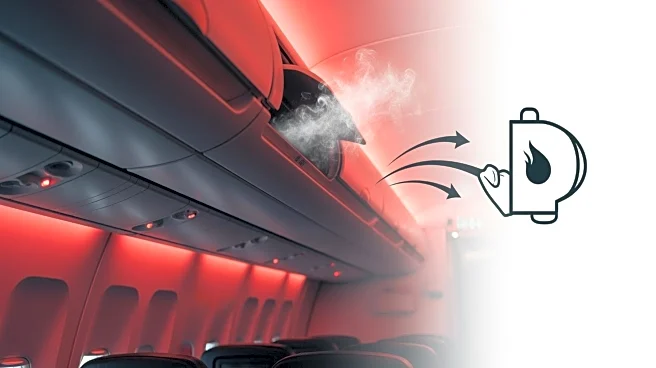What's Happening?
An Air China flight, CA139, traveling from Hangzhou to Seoul Incheon, was forced to divert to Shanghai after a lithium battery in a passenger's carry-on luggage caught fire in the overhead bin. The incident
occurred on October 18, 2025, aboard an Airbus A321. The fire, characterized by large flames and black smoke, was contained by the cabin crew, preventing any injuries. The aircraft landed safely in Shanghai approximately 1 hour and 18 minutes after departure. Passengers were rebooked on another flight, resulting in a five-hour delay. Air China confirmed the incident, emphasizing the crew's adherence to safety procedures.
Why It's Important?
This incident underscores the ongoing safety challenges posed by lithium-ion batteries on commercial flights. Such batteries are prone to thermal runaway, a condition that can lead to fires. While cabin fires can be managed by trained crew members, similar incidents in the cargo hold could have catastrophic consequences due to limited access and control. The increasing frequency of these incidents highlights the need for stringent safety protocols and passenger awareness regarding the transportation of lithium batteries. Airlines and regulatory bodies may need to reassess current safety measures to prevent potential disasters.
What's Next?
Airlines and aviation authorities might consider revising guidelines for carrying lithium-ion batteries on flights. Enhanced passenger screening and stricter enforcement of existing regulations could be implemented to mitigate risks. Additionally, airlines may invest in advanced fire suppression technologies for both cabins and cargo holds. The aviation industry will likely monitor this incident closely, potentially influencing future safety standards and passenger education campaigns.
Beyond the Headlines
The incident raises broader questions about the reliance on lithium-ion batteries in consumer electronics and their safe transportation. As the demand for portable electronic devices grows, so does the risk of similar incidents. This could spur innovation in battery technology, focusing on safer alternatives. Furthermore, the event may prompt discussions on the ethical responsibilities of manufacturers and airlines in ensuring passenger safety.









